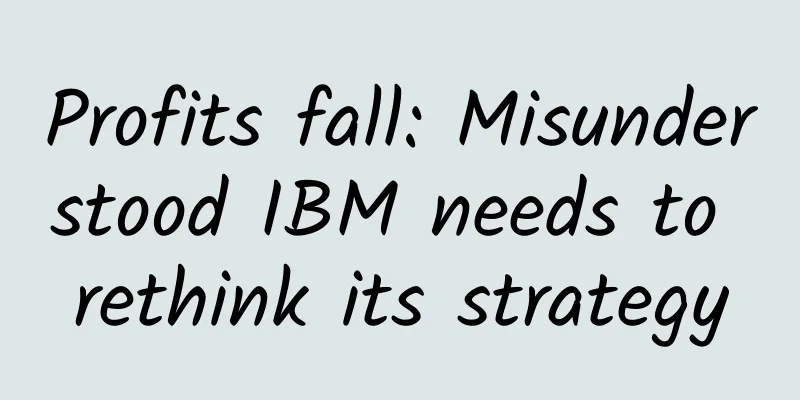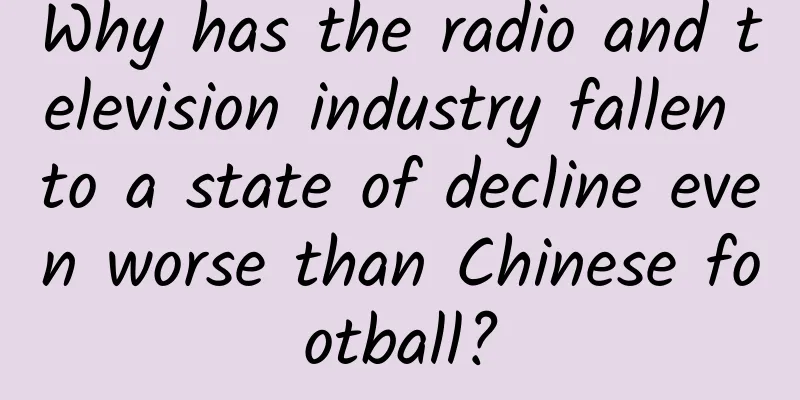Profits fall: Misunderstood IBM needs to rethink its strategy

|
Recently, IBM has once again become the focus of the industry. Unlike before, this time IBM has become a negative example, mainly because its latest third-quarter financial report showed a 99.6% year-on-year decline in net profit; IBM's stock price fell 7.1%, hitting a new low since September 2011; Buffett, who invested in IBM, lost more than $1 billion. These headlines of related media reports on IBM's performance seem to make IBM collapse overnight. In fact, the truth is far from that. First, let's look at IBM's financial report. In this fiscal quarter, IBM announced that it would subsidize its chip manufacturing business to Globalfoundries through a transaction, so it recorded a pre-tax expense of $4.7 billion in IBM's third-quarter financial report. This expense includes the write-down of asset values and the payment of $1.5 billion in cash to Globalfoundries. Calculated in this way, excluding one-time expenses related to the chip business, IBM's operating profit in the third quarter actually only fell by 10% year-on-year. In addition, from the summary of IBM's financial reports for the first two quarters (first half of this year), IBM's net profit reached US$6.5 billion, a year-on-year increase of 4%, compared with US$6.3 billion in the same period last year; net profit reached US$6.5 billion, a year-on-year increase of 4%, compared with US$6.3 billion in the same period last year; diluted earnings per share were US$6.37, a year-on-year increase of 14%, compared with US$5.6 in the same period last year. Not calculated in accordance with US generally accepted accounting principles, IBM's operating net profit in the first half of the year was US$7 billion, the same as the same period last year; diluted operating earnings per share were US$6.82, an increase of 9.5% from US$6.23 in the same period last year. From this point of view, IBM's performance is not as bad as the media headlines in the third quarter said, to the point of alarmism. However, if measured according to IBM's own standard of $20 per share in 2015, there is indeed a big gap. It is precisely based on this that after clarifying the misunderstanding that IBM's profits fell sharply this quarter, we would like to focus on the issue of re-examining IBM (both the industry and IBM's own self-examination). The industry knows that IBM's earnings per share (EPS) of $20 by 2015 was the goal of the five-year development plan set by IBM CEO Sam Palmisano as early as 2010. In early 2012, Ginni Rometty, who succeeded Sam Palmisano as IBM CEO, reiterated this goal in the annual report at the time. We really don't know what IBM based this goal on at the time, but from IBM's latest financial report, its CEO Ginni Rometty announced that it would abandon the promise of adjusted earnings of $20 per share by 2015, which caused IBM's stock to plummet. It can be seen that this goal was set more for the interests of shareholders and investors, and for this reason, the current industry development trend and its own strength were misjudged. So what IBM needs to do now is to let shareholders and investors (including IBM itself) understand that the business model that over-emphasizes or takes EPS as the basis of the company's overall strategy is no longer suitable for the current and future development trends of the industry. How do you know? In the minds of the industry and the media, since IBM's last successful transformation, services and software have always been considered IBM's strengths, so strong that whenever software and services are mentioned, IBM is the only one who can be mentioned. Even IBM itself, under this kind of publicity, believes that it is unrivaled in software and services. However, this is not the case. At least since last year, IBM has lost its leading advantage in software. For example, a report released by Gartner at the beginning of this year stated that Microsoft is still the world's largest software company in terms of revenue, with software revenue of approximately US$65.7 billion. The second largest company is Oracle, with software business revenue of US$29.6 billion, surpassing IBM in one fell swoop. Of course, we are not saying that IBM's software and services do not have their own advantages, but that IBM has strong competitors in its core business areas (accounting for 3/4 of IBM's revenue), such as Oracle, Microsoft, HP, EMC, etc., which can all be competitors of all or part of IBM's business. From this point of view, Microsoft, which has been criticized by the industry for its slow transformation, is actually far better than IBM. After all, Windows and Office, as Microsoft's core businesses, have few competitors in their respective fields. Unfortunately, IBM did not seem to realize this situation. In order to achieve its EPS target, it successively sold its X86 server business, which was not conducive to EPS. However, during the short transaction approval process, its position as the revenue leader in the server market was taken away by HP. We are not saying that IBM should not sell its X86 server business, but we are using this to prove that a blind EPS-only strategy will give competitors opportunities and may not be worth the loss. Speaking of opportunities, due to the large number of competitors in IBM's core areas and the trend of industry migration and development towards cloud computing, the industry believes that IBM's transformation is too slow and hopes that IBM will gain revenue and growth opportunities in the cloud computing market as soon as possible. It is undeniable that in order to adapt to this change, IBM has established a separate department for cloud computing business. In order to change the status of IBM's cloud computing business, IBM acquired SoftLayer for US$2 billion in 2013, and this year it promised to invest US$1.2 billion to strengthen data center products. Nevertheless, when it comes to cloud computing, I believe that the industry will soon think of Amazon, the current leader and leader in the cloud computing market. But who noticed that in order to maintain this leading position, Amazon significantly reduced the price of its cloud computing service AWS last quarter (the reduction ranged from 28% to 51%), and the result of this price reduction strategy was a sharp drop in Amazon's revenue and profits in that quarter. Why? Because in this market, Microsoft, Google, etc. are all competing with Amazon in an aggressive price war. In addition to large companies such as Microsoft and Google, start-ups such as Digital Ocean, Joyent and Contegix pay more attention to innovation in the field of cloud computing, while miniaturizing the user scale (some have only about 10,000 users). For example, Digital Ocean has only 15,000 active users. It is precisely based on the current competitive mode of the cloud computing market that Amazon's Chief Financial Officer Tom Szkutak admitted that price cuts have caused a slowdown in the revenue growth of the business, and also pointed out that the company believes that price cuts will help AWS expand its market share in the long run. I wonder how IBM, which focuses on EPS or uses EPS as a strategic formulation and guidance, views this competitive mode? How will it participate? However, we believe that if IBM continues to stick to this strategy in the future, it will likely lose the opportunity to seize the cloud computing market, after all, the current cloud computing market is still in the early stages of competition. The early competition methods (such as low prices, small users, etc.) are exactly contrary to IBM's strategy. It is also worth mentioning that in the current cloud computing market, IBM's competitiveness is not among the best. For example, Gartner's research results based on the "Magic Quadrants" for multiple companies found that Microsoft leads in "Cloud Infrastructure as a Service", X86 server virtualization, enterprise application platform as a service, and public cloud storage services. IBM is only in the niche market quadrant, not only lagging behind Amazon, Microsoft, Google, but even behind HP. This situation undoubtedly makes it more difficult for IBM to implement the above strategy. In summary, we believe that with the help of this financial report, while clarifying the industry's misunderstanding of IBM's financial report, we also hope that IBM can judge the situation, re-examine its EPS-based strategy and make changes. After all, the strategy formulated based on this is no longer suitable for the current core and future cloud computing business competition environment and characteristics of IBM. Therefore, abandoning the EPS-centered strategy formulation and implementation as soon as possible is the biggest challenge IBM faces in its transformation, in addition to the misunderstanding of this financial report. As a winner of Toutiao's Qingyun Plan and Baijiahao's Bai+ Plan, the 2019 Baidu Digital Author of the Year, the Baijiahao's Most Popular Author in the Technology Field, the 2019 Sogou Technology and Culture Author, and the 2021 Baijiahao Quarterly Influential Creator, he has won many awards, including the 2013 Sohu Best Industry Media Person, the 2015 China New Media Entrepreneurship Competition Beijing Third Place, the 2015 Guangmang Experience Award, the 2015 China New Media Entrepreneurship Competition Finals Third Place, and the 2018 Baidu Dynamic Annual Powerful Celebrity. |
<<: Group buying ends: How does Hongtu Sanbao “blend” Lashou?
>>: Samsung is at most "stepping down" from the altar, not falling into the abyss
Recommend
Where did the warning color of locusts come from?
Produced by: Science Popularization China Author:...
TV trial version of "The World of Jianghu" experience: multi-dimensional development shows the style of martial arts
2015 was the year when the IP industry exploded, ...
Baidu promotion Juping advertising delivery mode, targeting method, and selling price!
1. Delivery 1) What are the different modes of Ju...
Bread crumbs scattered on Mars: Hansel and Gretel, please reply!
With "Martian Breadcrumbs" - an unprece...
Why do mosquitoes taste the water before laying eggs?
Speaking of mosquitoes, most people have probably...
5 ways to increase the weight of Tik Tok!
So the question is, how to improve the weight of ...
my country's first independently designed nuclear power plant has been generating electricity safely for 30 years
"Independent innovation is the soul of the d...
Satellite cloud maps help you understand the sky through clouds. What do various weather phenomena look like on satellite cloud maps?
Clouds are like a "signboard" for the w...
The top ten domestic and international science and technology news of 2021 are here! China Central Radio and Television Station released
China Central Radio and Television released The t...
TV is also crazy: Konka TV Slim challenges 10 extreme tortures
Page 1 Product Introduction, Test Methods 1. Eval...
How can event operations improve user conversion?
Someone asked me: I have been working in the comm...
Baidu search promotion ocpc daily optimization guide
When Baidu ocpc was first promoted in 2018, not m...
Zhou Hongyi: 360 is too conservative in making smart hardware
[[141850]] Zhou Hongyi said that the Internet bus...
Absolutely useful information! Nine abnormal ways of operating Taobao and Tmall
Text/E-commerce consultant Lao Lu First summarize...
Protecting Audio Privacy During Cell Phone Calls with Sound Masking
background Malware violates the privacy of mobile...









